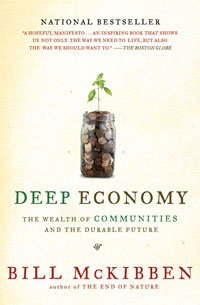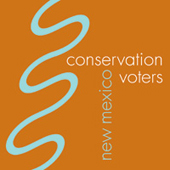Friday, March 21, 2008
Bill McKibben: Talk and Booksigning on 'Deep Economy'
 Albuquerque independent bookstore will host environmental realist and journalist Bill McKibben at UNM's SUB Ballroom A & B in Albuquerque at 7:00 PM on Wednesday, March 26, 2008 to talk about and sign his new book, Deep Economy. Challenging the prevailing wisdom that the goal of economies should be unlimited growth, McKibben argues that the world doesn't have enough natural resources to sustain endless economic expansion and looks at news ways to structure our civilizations. If we are to thrive or even survive within the fragile balance of nature, our definitions of concepts like "wealth" and "growth" and "progress" must change dramatically.
Albuquerque independent bookstore will host environmental realist and journalist Bill McKibben at UNM's SUB Ballroom A & B in Albuquerque at 7:00 PM on Wednesday, March 26, 2008 to talk about and sign his new book, Deep Economy. Challenging the prevailing wisdom that the goal of economies should be unlimited growth, McKibben argues that the world doesn't have enough natural resources to sustain endless economic expansion and looks at news ways to structure our civilizations. If we are to thrive or even survive within the fragile balance of nature, our definitions of concepts like "wealth" and "growth" and "progress" must change dramatically.
A thoughtful post at The Blue Voice about the coming of the Vernal Equinox talks about McKibben's alarming but action-oriented message about the state of Planet Earth and ways we might counter the dire effects of global warming and learn to live in a manner that minimizes damage to the environment, while actually bolstering our sense of community and increasing our emotional and spiritual fulfillment.
As we find ourselves enmeshed in the dizzy day-to-day, a presidential race for the ages, mounting economic worries and complicated choices regarding Iraq and other pressing issues, a much more serious global (in every sense) question looms: how can we create sustainable communities to mitigate and survive what we know is coming as a direct result of how we've been living for the past hundred years or so?
Deep Economy tackles these issues head on:
In this powerful and provocative manifesto, Bill McKibben offers the biggest challenge in a generation to the prevailing view of our economy. For the first time in human history, he observes, "more" is no longer synonymous with "better"—indeed, for many of us, they have become almost opposites. McKibben puts forward a new way to think about the things we buy, the food we eat, the energy we use, and the money that pays for it all. Our purchases, he says, need not be at odds with the things we truly value.
McKibben's animating idea is that we need to move beyond "growth" as the paramount economic ideal and pursue prosperity in a more local direction, with cities, suburbs, and regions producing more of their own food, generating more of their own energy, and even creating more of their own culture and entertainment. He shows this concept blossoming around the world with striking results, from the burgeoning economies of India and China to the more mature societies of Europe and New England. For those who worry about environmental threats, he offers a route out of the worst of those problems; for those who wonder if there isn't something more to life than buying, he provides the insight to think about one's life as an individual and as a member of a larger community.
... As McKibben sees it, three fundamental challenges to the fixation on growth have emerged. First, we are producing more inequality than prosperity, more insecurity than progress. Second, we do not have the energy needed to keep producing more at our current rate. And third, growth is no longer making us happy. The title of DEEP ECONOMY is drawn from “deep ecology,” a term coined a generation ago by environmentalists who advocated for more attention to be paid to the choices that we make in our daily lives, rather than coming up with another set of laws as Band-Aids against environmental damage. Now, as we address economic issues as they relate to our environment and community, McKibben urges a similar shift in our thinking. He offers a realistic, if challenging, scenario for a hopeful future. As he so eloquently shows, the more we nurture the essential humanity of our economy, the more we will recapture our own.
Besides being a prolific writer, McKibben is a creative environmental activist:
In late summer 2006, Bill helped lead a five-day walk across Vermont to demand action on global warming that some newspaper accounts called the largest demonstration to date in America about climate change. Beginning in January 2007 he founded stepitup07.org to demand that Congress enact curbs on carbon emissions that would cut global warming pollution 80 percent by 2050. With six college students, he organized 1,400 global warming demonstrations across all 50 states of America on April 14, 2007. Step It Up 2007 has been described as the largest day of protest about climate change in the nation's history. A guide to help people initiate environmental activism in their community coming out of the Step It Up 2007 experience entitled Fight Global Warming Now was published in October 2007 and a second day of action on climate change was held the following November 3.

As we move into Spring and experience once more the awakening and greening of our high desert ecosystems, it seems like a perfect time to share some time with McKibben and his ideas for creating Deep Economy.
March 21, 2008 at 12:04 PM in Books, Economy, Populism, Environment, Events | Permalink | Comments (1)
Thursday, March 13, 2008
Bingaman, Udall Rated Tops in NM Delegation on Middle Class Issues
Short clip of Tom Udall talking about the disastrous economic policies of the Republicans and how Democrats are dedicated to serving the middle class (3.1.08 Bernalillo County Dem Convention)
The nonpartisan Drum Major Institute for Public Policy just released its ratings of members of Congress based on their voting on legislation that impacts the middle class. The letter grade was given for voting in 2007 and the percentage number applies to votes so far this year:
Here's DMI's explanation of their analysis and grading system and why they utilize it. Even though Republicans like to pretend they're for the ordinary folks, almost across the board their votes say otherwise. With economic woes exploding this year, especially for middle class workers, the economy consistently appears at or near the top of the list of what's important to voters this election year. Democratic candidates should fare extremely well, including Rep. Tom Udall, the Congressman with the A plus rating who's running for U.S. Senate against whoever wins the Heather Wilson - Steve Pearce dustup on the Repub side.
(Video clip by M.E. Broderick.)
March 13, 2008 at 12:56 PM in 2008 NM Senate Race, Economy, Populism | Permalink | Comments (1)
Monday, January 21, 2008
What You May Not Know About Dr. Martin Luther King Jr.
Note: Rep. Tom Udall (NM-03) will offer remarks and State Treasurer James Lewis will deliver the keynote address during King holiday celebrations at the state Capitol today at 1:00 PM. The event, organized by Santa Fe's chapter of the NAACP, will also feature music and other speakers who will highlight King's support for higher wages and better conditions for working men and women.
From the War on Greed campaign and Brave New Films: Today we honor Dr. King's birthday. We all know him because of his historic impact on civil rights, but many don't realize that later in life he fought just as passionately for the rights of workers and against the entrenched institutions of injustice.
"Equality means dignity. And dignity demands a job and a paycheck that lasts through the week."
The War On Greed is exactly this kind of fight. The livelihoods of families have been directly attacked by the actions of buyout billionaires like Henry Kravis putting Wall Street's special interests ahead of his 800,000 employees... and pocketing $51,000 an hour in the process.
The first step must be taxing these buyout billionaires at a fair tax rate. It will not solve all the problems, but it is a strong and forceful beginning. With the presidential campaigns underway, it is the perfect time to force this issue into the campaigns the way we did with Wal-Mart and Iraq for Sale.
As our friend Rev. Yearwood, leader of the Hip Hop Caucus, has said: "We are facing a lunch counter moment for the 21st century."
Please join us at our virtual lunch counter by signing the petition to presidential candidates demanding they pledge to close the loopholes and tax the tax dodgers. Buyout billionaires are a menace to our economy. People are hurting, badly, and we must take beginning steps to bring the issue of corporate greed and economic equality to the nation's attention.
January 21, 2008 at 06:34 AM in Corporatism, Current Affairs, Economy, Populism, Film, Labor, Minority Issues, Poverty | Permalink | Comments (0)
Thursday, January 17, 2008
A Letter From The People: Touring the Realm of the Dispossessed
Since we have a certain blogger with long-time ties to the Roundhouse wall leaners and power brokers waxing poetic today about well connected insiders, hordes of lobbyists with deep pockets and martini-fueled dealings in dark bars in Santa Fe, I thought I'd take a similar tack from The People's point of view.
You know, us -- the little people out here in the wilderness who are supposed to wait silently and submissively for the word to come down from on high on what will and will not be done in our name by the powerhouses of La Politica. We're the ones who won't get real reform related to health care, ethics or campaign finance because our "leaders" in the Legislature -- and especially in the "independent" Senate -- have come to depend on the ready money and perks from people who want to preserve the status quo and the profits for themselves. The public and the common good be damned.
Citizen Lobbyists
Our citizen lobbyists travel to the Roundhouse or interim committee meetings on their own dimes. Many take vacation days to do so. They car pool to save money. Their meals come from brown bags, not the Santa Fe hot spots designed for seeing and being seen. Those who can't afford the trip or can't get time off from work have to be content with phone calls to legislative secretaries and emails to legislators that usually get little or no response. Even if they succeed in getting their needs met in committee after committee with the help of the honest members of the legislature, their bills are often killed when or even just before they get to the Senate or House floor by the "leaders" dedicated to keeping power to themselves.
With no big chunks of cash or complimentary happy hours to offer, these citizen lobbyists too often get only a blind eye and a deaf ear when they voice their concerns. After all, they have no clout. They don't buy legislators drinks or invite them to buffets and cocktail parties or throw unlimited amounts of money into their "campaign funds" or hand them tickets to boxing matches or football games, or oooh and ahhh over them when they enter casinos or racetracks.
Citizen lobbyists have to scratch for information about what's going on with bills that will personally affect their daily lives, their health, their work, their children, their futures. And when they show up at committee hearings, they're often treated like unwelcome outsiders who take up precious time demanding to be heard when everyone who's anyone knows the deals have already gone down behind closed doors.
The Result
Because this is how the system presently works, we get things like bills proposing massive tax breaks for the coal-burning Desert Rock power plant, health reform bills that ignore the overwhelming support of the people for the Health Security Act and a summer's worth of testimony at hearings, pronouncements that public funding for elections is off the table, plots to kill the Domestic Partnership Act with last-minute, shady maneuvers and inflated, "privatized" contracts to conduct or "oversee" government functions. I could go on.
This bunch won't even allow floor proceedings to be shown online, despite $75,000 having been appropriated to do so. What don't they want us to see? Wouldn't it be fun to send a phalanx of citizens with video cameras to the Roundhouse corridors and swanky lounges of Santa Fe to track the comings and goings, the whispers and handshakes, that constitute way too much of what goes on in the Capitol? A regular YouTube bonanza.
I know our reps and senators are supposed to be doing the people's business, but as is often the case these days in state capitols and the halls of Congress alike, they mostly go about doing the business of the highest bidders, of those who wield power to get earmarks and loopholes, of those with profitable rackets to protect. These days, too many consider their real constituencies to be not the people who elect them, but the brokers, the insurance moguls, the financial market manipulators, the insider stock traders, the shady real estate developers, the for-profit prison operators, the pay-day loan sharks, the "defense" contract proliferators, the fake "homeland security" money suckers, the outrageously compensated CEOs and the high and mightily titled corporate investor class.
Somehow, not one bit of poetry, not one shred of romance or nostalgia comes to mind when I think about what's going on in Santa Fe right now. Can you blame me?
The Good Ones
Of course there are any number of genuinely honest, committed, hardworking legislators who work their bodies to the bone all year long to try and get a little something for the people, for the community, for the common good, for justice, for equality. Unfortunately, in a greed-filled and close-minded climate like the one that prevails these days, they're about as well respected by the "leaders" in our government as ordinary people are. They get the shaft and the run-around just like we do. And I'm pretty darn sure they're not feeling poetic and nostalgic about it either, as our critical needs go unmet while the elite among us count their chits.
January 17, 2008 at 03:41 PM in Business, Corporatism, Economy, Populism, Ethics & Campaign Reform, Healthcare, NM Legislature 2008 | Permalink | Comments (5)
Saturday, January 12, 2008
Make Real Change With Bush Coins!
Hat tip to Booman Tribune
January 12, 2008 at 11:56 AM in Economy, Populism, Visuals | Permalink | Comments (2)
Saturday, January 05, 2008
Register Now for Presentation on Community Value Organizing
From Martha Domiguez, World Voices: Join us!
Community Value Organization
Presented by John Rogers of Germany
Saturday, January 12, 2-4 PM
Plumber Pipefitters Hall
510 San Pedro SE, Albuquerque, NM
Sponsored by World Voices Independent Newspaper
Learn about:
- Strengthening local economies and building community
- Currency circulation, keeping wealth local and increase numbers of local trades
- Poverty alleviation; social inclusion; community capacity building; sustainable development
John Rogers, who is visiting New Mexico from Europe, has been experimenting with local community currencies for the last 14 years –- working as an organizer, administrator, writer, trainer and lecturer. In 1993 he started a Local Exchange Trading System (LETS) in the UK that is still trading today. He founded the Wales Institute for Community Currencies which supports communities to start viable systems and researches their effectiveness. He now runs his own consultancy and training practice Value for People that spreads best practices in organizing and designing local economies and currencies.
Donation to attend is $25. Call 275-0597 to reserve your place by January 7th, Checks should be made payable to World Voices and mailed to 10805 Ralph NE, Albuquerque, NM 87112.
January 5, 2008 at 10:57 AM in Economy, Populism | Permalink | Comments (0)
Friday, December 07, 2007
Quote of the Day: Conservatism, Immigration and PR

As Phil Agre wrote in this much discussed article about the definition of conservatism, "Conservatism is the domination of society by an aristocracy ... [it] is incompatible with democracy, prosperity and civilization in general. It is a destructive system of inequality and prejudice that is founded on deception and has no place in the modern world."
Modern conservatism's most successful strategy was to merge public relations and politics into a seamless operation in which it could use modern marketing methods to convince people to vote against their own interests. In that sense, right-wing populism is just another marketing campaign for the aristocrats. And it's working.
... It is no accident that illegal immigration has emerged as a theme at a time of epic corruption among the conservative aristocrats in business and government. Someone must be blamed for the fallout, and it isn't going to be them. This may seem counterintuitive, considering that business also likes cheap labor, but that's just commerce, and commerce is only a tool of the true conservative mission -- preserving the aristocracy.
Aristocracy is, by definition, un-American. The question is how many Americans will be "messaged" into believing they are doing the patriotic thing by behaving like subjects and hunting down the foreign invader on behalf of their betters.
Read more of How Conservatives Manipulate People Into Voting Against Their Best Interests by the always excellent Digby.
December 7, 2007 at 01:12 PM in Corporatism, Economy, Populism, Immigration | Permalink | Comments (0)
Thursday, November 29, 2007
Victory: Santa Fe City Council Votes Unanimously to Expand Living Wage Law
Congrats to the Santa Fe Living Wage Network and everyone else who worked hard to expand the requirements of Santa Fe's Living Wage law to almost all workers and mandate annual raises tied to the cost of living. When the law was initially proposed, all we heard was doom and gloom from its critics, who predicted job losses and financial ruin if it passed. Those critics have been proven dead wrong, as they have in other places where minimum wage raises have been implemented. Instead of damaging the economy, the higher wages have pumped more money into the local economy, helped small businesses and given many more people additional money for necessities, as well as a chance to have a few amenities in their lives. It's a win-win situation.
From an article in the Santa Fe New Mexican:
Almost all workers in Santa Fe will be paid a minimum wage of $9.50 per hour beginning in January, and they can expect pay increases based on the cost of living in future years, following Wednesday night's unanimous City Council vote to broaden its rules on the so-called "living wage."
The rules formerly required employers with 25 or more workers to pay the minimum wage, but the newly adopted amendments apply the highest minimum wage in the nation to employees of all businesses that require city business licenses starting in 2008.
The other major change to the ordinance ties future wage increases to inflation as calculated by the consumer price index. Beginning Jan. 1, 2009, and each year thereafter, the wage will be adjusted upward with council approval by an amount corresponding to the previous year's index increase, if any.
The amendments to the city's 2002 Living Wage act represent a negotiated compromise between those who originally worked against the measure -- and unsuccessfully challenged it in court -- and advocates for working people. In exchange for expanding the minimum to every business licensed by the city and mandating future yearly increases tied to the consumer price index, advocates agreed to forego the scheduled increase to $10.50 an hour on January 1, 2008 and delay another raise until January 1, 2009.
Mayor David Coss said Wednesday's vote — which was greeted with a standing ovation, whistles and cheers from the audience — was the final chapter in a yearslong community struggle.
"In 100 years, historians and philosophers and poets are going to read the minutes from the living wage hearings and get a lot out of it," he said.
November 29, 2007 at 08:45 AM in Economy, Populism | Permalink | Comments (4)
Wednesday, November 28, 2007
Guest Blog: ABQ City Council to Reconsider Public Subsidies for Large Developers at December 3 Meeting
This is a guest blog by Gabriel Nims, the Executive Director of 1000 Friends of New Mexico. He does a great job of explaining public financing tools for development called TIFs and TIDDs -- and how they are being used in ways that can be damaging to our communities, water supplies and economic future. He asks us to join 1000 Friends of New Mexico, the SouthWest Organizing Project, AFSCME , New Mexico Voices for Children and others in pushing for a reconsideration of the TIDD concept, as well as a proposed ban on their use in what are called 'green fields'.
The issue is on the agenda at the Albuquerque City Council meeting on December 3, 2007 in the form of amendments sponsored by Councilor Michael Cadigan. Please contact your City Councilor, State Legislator and Governor Richardson to weigh in on this issue.
The debate over growth and development in the Albuquerque region has taken a turn to the absurd over the past year with the emergence of a new set of crazy acronyms: TIF and TIDD.
Many will remember the political uproar over the Planned Growth Strategy, better known as PGS. The ire of development interests in the city was raised to the point where they felt compelled to create a political action group called CGA, or Citizens for a Greater Albuquerque, with the sole purpose of denying “no-growth” and “anti-Paseo” candidates seats on the City Council during the 2003 municipal elections. And lest we forget the infamous and now seldom-mentioned ABQPAC scandal.
But Tax Increment Financing, or TIF, and its little spawn, the Tax Increment Development District, TIDD, opens a new chapter in the book of urban growth-related acronyms. What these new acronyms mean and do is a very complicated story, which is why you may just be hearing about this for the first time. But allow me to explain as best I can. For deeper understanding of how TIF works check out publications from Good Jobs First Good Jobs First and the studies by FRESC in Denver.
What Is TIF?
TIF is an economic development tool available to developers in 48 states. TIF was originally conceived as a way to induce reinvestment in older, blighted areas deemed too risky or costly for private investors to improve.
It works like this:
- an area (the District) is defined for (re)development;
- a baseline of property and, as in New Mexico, gross receipts tax is established within the district;
- a deal is cut between the developer and the taxing agencies that allows the developer to receive up to 75% of the increase (the Increment) in tax revenue resulting from the improvements and new economic activity within the District;
- the developer is granted the Increment for up to 25 years to offset the costs of infrastructure (sewers, sidewalks, roads, etc) within the District.
Phew!-- Any questions?
New Mexico TIF law puts a new twist on this mechanism. Where other states try to limit the tool’s use to redevelopment by applying strict criteria for demonstrating blight, New Mexico, with some nudging from developer lobbyists, requires a developer to simply demonstrate increased economic development, regardless of where a district is created, blight or otherwise.
Therein lies the rub.

TIDDs in Greenfields
In New Mexico, greenfields are only green for a few weeks after intermittent monsoons, but it’s a commonly used term referring to the undeveloped expanses that surround our cities and towns. In Albuquerque, our greenfields of notoriety are Mesa Del Sol -- about 13,000 acres between the Sunport and Isleta Pueblo -- and Westland -- the whopping 55,000 acre former Atrisco Land Grant on the West Side. The developers, Forest City Covington and SunCal, respectively, are salivating over the chance to turn these greenfields into billions of greenbacks -- and they expect to use TIDDs to get as many greenbacks as they can.
The problem? Refer to step 2 above. In a greenfield, the baseline tax revenue is next to nil because nothing is out there. That means the Increment (step 3) is virtually the entire increase in revenue that will come from the District. For Mesa Del Sol, that translates to $500 million greenbacks from the state’s cut of taxes that will be generated in just the first phase of the development. Mesa Del Sol will also get percentages of the City and County’s gross receipts and property tax revenue. All of this cash to a developer for the next 25 years!
For perspective -- this represents the largest TIF arrangement ever allowed, in terms of land area and money, anywhere in the country. Wow. A new chapter in the urban development book, indeed! And a very dangerous one, too!
 Dangerous Problems
Dangerous Problems
Why? First and foremost -- it’s the precedent this sets for how TIF is applied in New Mexico. You think Mesa Del Sol’s deal is big? One only needs to look across the river to SunCal’s 55,000 acres to anticipate TIDDs of even greater magnitude. And, not surprisingly, TIDDs are now popping up in other parts of the state.
So there will be a rush on creating TIDDs! From a state finance perspective, this is a very dangerous precedent. The state general fund, recently bolstered by oil and gas revenue, may soon find itself in a precarious position after millions in revenue from businesses and properties in these districts is captured by TIDDs, first in Mesa Del Sol, and likely by new developments all over. Even with the extra support from oil and gas revenue, the state can’t find enough revenue to meet its current obligations. Transportation funding dried up this year, health care costs continue to rise and we can’t find the money to build schools fast enough or pay enough to retain/recruit high-quality educational professionals.
Fast forward five years to this likely scenario: The state is strapped for cash -- the economy has slowed and oil and gas revenue declines. Oops! Millions of dollars of revenue needed by the state to cover the public’s shared needs is tied up for the next 20 years in TIDD deals for developers laughing all the way to the bank. Faced with such a predicament, the state must choose to cut back on services, raise taxes or both.
It gets worse. TIDDs in greenfields can really hurt existing neighborhoods, small businesses and any hope of managing growth in sustainable ways. Because TIDDs can be created just on the basis of economic development, there is no limit on their magnitude. Mesa Del Sol will be an economic giant, subsidized with public dollars, competing directly with Albuquerque. As will SunCal’s Westland, only a few notches bigger.
Imagine these areas as huge vacuums sucking jobs, economic activity, homebuyers and vitality out of the existing community. Recall one of the basic principles of the Planned Growth Strategy: to reinvest and revitalize the existing community as a priority over building brand new at the fringe. The PGS pointed to a $1.7 billion backlog in basic infrastructure needs within the city as justification for this approach.
Tell me how diverting the city’s tax revenue to private mega-developers on the fringe will help us address this backlog, when what we currently receive is already not enough? When the city can’t reach a 1000 officer police force because money is tight, how will we find the public safety professionals for these new fringe developments that, combined, are projected to grow the city from 550,000 population to 700,000 or more over the ensuing decades? Never mind all the other services the public expects to maintain a reasonable quality of life.
Oh yeah -- and where is the water?
The Response
By and large, developer requests for TIDDs have sailed through elected bodies at the state and in Albuquerque and the same will likely occur at Bernalillo County. Mesa Del Sol was the first out of the gate securing approval from the City and State for the creation of five TIDDs earlier this year.
With SunCal in the batter's box, West Side City Councilor, Michael Cadigan, was the first to decry “buyer’s remorse” on the Mesa Del Sol deal and he quickly introduced a bill prohibiting the creation of TIDDs in greenfields last Spring. A series of deferrals and compromise drafts have led to final action on his measure at the upcoming City Council hearing on Monday, December 3rd, 2007.
Many groups including 1000 Friends of New Mexico, SouthWest Organizing Project, New Mexico Voices for Children, and AFSCME strongly favor prohibiting TIDDs in greenfields.
The development community stands by their arguments that TIDDs are a necessary ‘incentive’ to creating jobs and high-quality “new urbanist” communities. The developers have carefully constructed smoke and mirrors to demonstrate how wonderful and safe TIDDs for their developments will be. They’ve spared no expense hiring the best consultants, lobbyists and PR machines in the business, while placing sizable political contributions in the coffers of key office holders as extra insurance.
The reality is simply that state lawmakers have opened a Pandora’s Box, with little idea of the long-term consequences of allowing TIDDs in greenfields.
What You Can Do
If you are outraged, confused and concerned all at the same time, then you know more than the majority of our lawmakers about the pitfalls of these seemingly harmless acronyms: TIF and TIDD.
Actually, I urge you to express your feelings to your elected officials, starting first with your City Councilor , followed by your Legislators and even the FAIR BlogGovernor.
If you have any questions contact me at 1000 Friends of New Mexico.
Again, please take action by contacting your officials. Urge them to consider the consequences and keep the community’s, not the developers’, best interests in mind.
Gabriel Nims, Executive Director
gabe@1000friends-nm.org
505.848.8232
Editor's Note: This is a guest blog by Gabriel Nims, Executive Director of 1000 Friends of New Mexico. To learn more about this issue, watch KNME TV's show, New Mexico In Focus, this Friday night, November 30, at 7:00 PM, which will include a segment with Gerry Bradley from New Mexico Voices for Children discussing the issue of TIDDs and Councilor Cadiagan's proposed amendment.
Also see these informative posts on SWOPblogger that discuss the local TIDD situation:
- Forest City Covington and SunCal Early Favorites for Corporate Welfare IRBIE Awards
- TIDD's, TIF's, Taxes...We're all in bed with developers now
Guest blogging provides readers with an opportunity to express their views on relevant issues and may or may not reflect our views. If you'd like to submit a piece for consideration as a guest blog, contact me by clicking on the Email Me link on the upper left-hand corner of the page.
November 28, 2007 at 01:38 PM in Corporatism, Economy, Populism, Local Politics, Real Estate Development, Sprawl Development | Permalink | Comments (1)
Tuesday, November 27, 2007
(Updated) 11/28: Santa Fe City Council to Consider Living Wage Changes
UPDATE 11.29.07: Amendments to expand the Living Wage law to virtually all workers and mandate annual increases based on the consumer price index were passed unanimously by the Santa Fe City Council on November 28, 2007. Read about it here.
**********
From the Santa Fe Living Wage Network:
Come out to the Santa Fe City Council Meeting on Wednesday, November 28th, at 7:00 PM, at 200 Lincoln Avenue. Visit SantaFeLivingWage.org for more information. The City Council will decide the fate of living wage. We are first on the agenda and need a strong turnout so that the Council understands what the community wants. Please come out!
Santa Fe is proud of its living wage, the highest in the country. But we still need your help. Forty percent of Santa Fe workers aren't covered, and the current law makes enforcement difficult. Some councilors are thinking of exempting young people and disabled people from the living wage. We are supporting amendments that will expand the law to cover all employers, not just those with 25 employees or more. The amendments will also establish an automatic cost of living increase every year, starting January 1, 2009. Please join us that night to make sure the City Council does the right thing.
Here are other ways you can help:
1. Sign The Petition by clicking here! We have at least 3,540 individuals, businesses, and religious, civic, labor, and community organizations have signed on as supporters of the proposed amendments to the Santa Fe Living Wage Ordinance. Click here to keep track of our progress and see who has signed. Please sign up if you have not signed already!
2. Contact your Councilor to tell them you support the Living Wage covering all Santa Fe workers including young people and the disabled. For contact information for the councilors in your district – and a link for their email address, click here. After you talk to your councilors, email us at info@santafelivingwage.org and tell us what they said.
November 27, 2007 at 09:49 AM in Economy, Populism | Permalink | Comments (0)



































